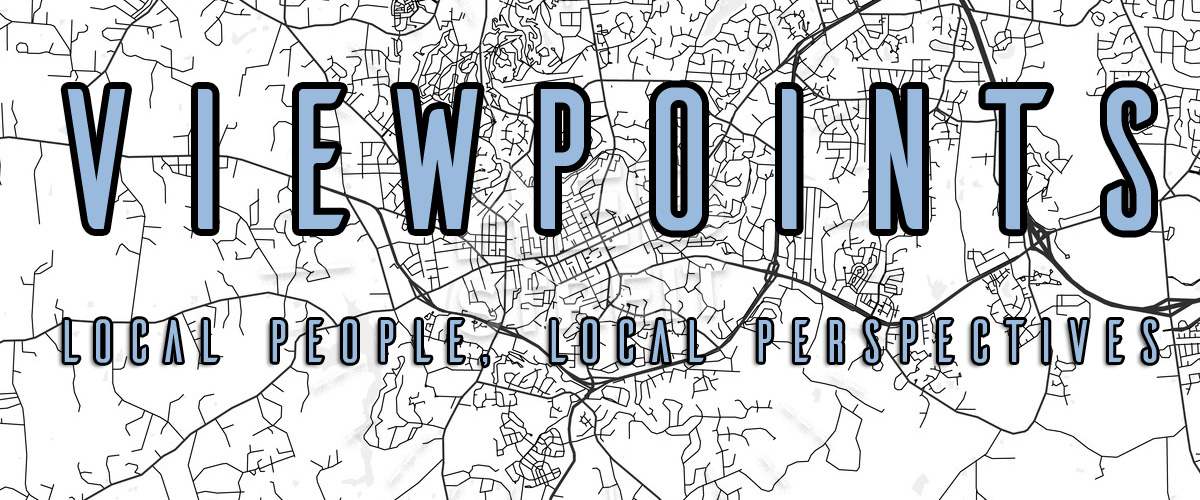
“Viewpoints” is a place on Chapelboro where local people are encouraged to share their unique perspectives on issues affecting our community. If you’d like to contribute a column on an issue you’re concerned about, interesting happenings around town, reflections on local life — or anything else — send a submission to viewpoints@wchl.com.
Let’s Reform Parking, Not Require It
A perspective from Martin Johnson
In 2012, the urban planner Jeff Speck published an important book on making our downtowns safer, economically vibrant, and resilient. His book, “Walkable City: How Downtown Saves America, One Step at a Time,” argues that downtowns are in trouble because civic and business leaders spent decades trying to adapt them for a world in which everyone drives a car.
The story he tells will be a familiar one to people in Chapel Hill. Instead of developing strategies to make downtown a more pleasant place to live, shop, and work, town officials tried to compete with suburban malls and shopping centers on who could build the most parking. Even as more and more money was spent building parking downtown, drivers continued to complain, as they still couldn’t park directly in front of their destinations like they could when they went to shopping centers. We ended up with the worst of both worlds—a downtown full of parking lots with empty sidewalks and, in many cases, storefronts. More parking didn’t save downtowns, Speck suggests—it killed them.
In the book, Speck profiles communities that were already making steps toward saving their downtowns. Portland, Oregon, invested millions in bicycle facilities. Lewistown, Pennsylvania, narrowed its streets. And he praises Chapel Hill as one of several cities that eliminated downtown parking minimums. Instead of requiring developers to build a fixed amount of parking that was based on the number of people expected to live, shop, or work in a building, Chapel Hill let developers decide how much parking they needed. While developers were at first reluctant to reduce on-site parking, just last year the town received a proposal for our town’s first car-free apartment building, which will be built at the corner of Rosemary and Columbia.
Next week, the Chapel Hill town council is considering a proposal to reinstate parking minimums downtown. Under the new proposal, developers will have to spend millions of dollars on unnecessary parking, setting our town back on its economic and environmental goals. Instead of encouraging developers to build affordable apartment buildings that cater to people who work or attend school here, this proposal will force them to build expensive condos for people who drive. While we should be focusing on building a vibrant, walkable downtown, this proposal aims to make us a less attractive version of Cary—which, by the way, is building a park downtown instead of a parking garage.
Our town leaders claim that they want people to walk, bike, and take the bus downtown. Why are they considering a proposal that the town’s own consultants suggest will encourage the opposite? I’m not sure, but here’s how we got here.
In 2018, Chapel Hill commissioned a respected national firm, Walker Consultants, to study the availability of parking downtown. Like most parking experts, Walker believes that a healthy downtown should have approximately 85 percent of its parking spaces, both on the street and in garages, filled at all times. If it’s more than that, parking prices are too low, and should be raised. If less than 85 percent of spaces are taken, the town has plenty of parking, and the town should look to other solutions—like signage, price reductions, or advertising—to solve any perceived problems.
Walker found that only 70 percent of parking spaces in Chapel Hill were occupied at any given time. According to the report, the town had 926 excess spaces, including 341 spaces that were publicly owned or on the street. While there were two individual blocks (near the corner of Columbia and Rosemary) that were more than 85 percent occupied, one could easily find parking by walking just a few blocks away. In 2020, the town council approved a 1,200-space parking deck that will add a net of 343 more spaces downtown, more than enough to meet demand on those blocks.
Chapel Hill residents were told that the new deck would pay for itself, so we didn’t need to worry about town finances. But, as some predicted, the deck has gone significantly over budget (from $28 million to $40 million), and now the town is trying to find a way to cover the construction costs without dipping further into the general fund.
The town’s response? Let’s double down on what hasn’t worked in the past. Town staff are asking the council to reinstate parking minimums downtown, requiring approximately two spaces for every apartment unit built, and far more for new restaurants and office spaces. At current rates, it costs $30,000 or more to build a single parking space. Under this proposal, a developer building a 50-unit apartment building downtown would be forced to build a minimum of 50 parking spaces on site, at a cost of $1.5 million, and pay a $10,000 “initiation fee” for each space they are required to have, but not allowed to build on site. If this proposal is adopted, everyone who lives, shops, or works downtown will pay more to subsidize parking.
Already, almost a third of the land downtown is reserved for private parking. We need an economic development and land use strategy that frees up this land for housing, office space, and other needs. If the town’s goal was to reduce the amount of parking downtown, or even just to make it easier to park, we’d be doing something else. Here’s a few ideas:
- Use price incentives to encourage people to park in our garages and consider dynamic pricing.
- We currently charge $1.75/hour for on-street parking, and $1.50/hour for garage parking. In Asheville, it is free to park in the public garage for the first hour, and each additional hour is $2. While someone parking in a Chapel Hill or Asheville garage for four hours pays the same rate ($6), a free hour of parking is obviously more enticing to visitors. It also makes garage parking more popular, freeing up street parking for those who truly need it.
- We should also consider dynamic pricing, which allows parking rates to increase as demand goes up, ensuring that there is always at least one space free per block. (The reverse is true as well. You get a discount if you park when there’s no demand). Chapel Hill already allows people to pay for parking using the Park Mobile app, reducing implementation costs.
- Expand the hours of parking enforcement to 10 pm.
- Currently, the town stops charging for on-street parking at 6 pm, and off-street parking at 8 pm, which leaves many people looking for free street parking at rush hour. In 2018, Walker Consultants recommended that the town extend the hours of enforcement to 10 pm for both on-street and off-street parking, which will raise revenue and make it easier for people to find somewhere to park.
- Incentivize developers to build car-free projects.
- If the town is interested in reducing the number of cars downtown, we should make it easier to build car-free and affordable buildings. We can do this by expediting review of car-free projects, and consider waiving other requirements, such as setbacks and height limitations, for projects that include affordable housing for low- and middle-income residents. Increasing the number of people living downtown will do far more to help local businesses than doubling down on parking subsidies.
- Create a new fund that can be used for things other than parking or ask all downtown businesses to pay for parking.
- Currently, the Town of Chapel Hill’s parking fund—which collects payment-in-lieu and other parking-related fees—can only be used to build more parking. As the town makes plans to take over Franklin Street from the state, we may soon need money to pay for street improvements. While the parking fund has lost money in the past, requiring money from general funds to replenish it, an effective pricing strategy would allow it to produce revenue in the future, which we could put toward street improvements. Another option would be to eliminate the use of the parking fund entirely and raise the downtown service district tax, paid by all property owners downtown, to pay for any parking-related shortfalls.
Chapel Hill’s leaders say that they want to create a walkable and vibrant downtown, but their actions suggest otherwise. Bringing back parking minimums will set the town backward at a time when Durham and Raleigh have eliminated parking minimums or will soon do so.
While our fare-free bus system, greenways, and downtown amenities make it easy to live here without a car, we will only see real change in our downtown if we stop subsidizing driving. We can either create a better downtown, or we can just build more parking garages.
Last week, the town’s Transportation and Connectivity Advisory Board voted against this proposal 8-1. This past Tuesday, the town’s Planning Commission unanimously voted against this proposal. Next week, the Chapel Hill Town Council will choose which future they want for our community.
Martin Johnson is a member of NEXT Chapel Hill-Carrboro (nextnc.org), a local advocacy organization that supports diversity, inclusiveness, economic growth, transportation options, and housing choices.
“Viewpoints” on Chapelboro is a recurring series of community-submitted opinion columns. All thoughts, ideas, opinions and expressions in this series are those of the author, and do not reflect the work or reporting of 97.9 The Hill and Chapelboro.com.


